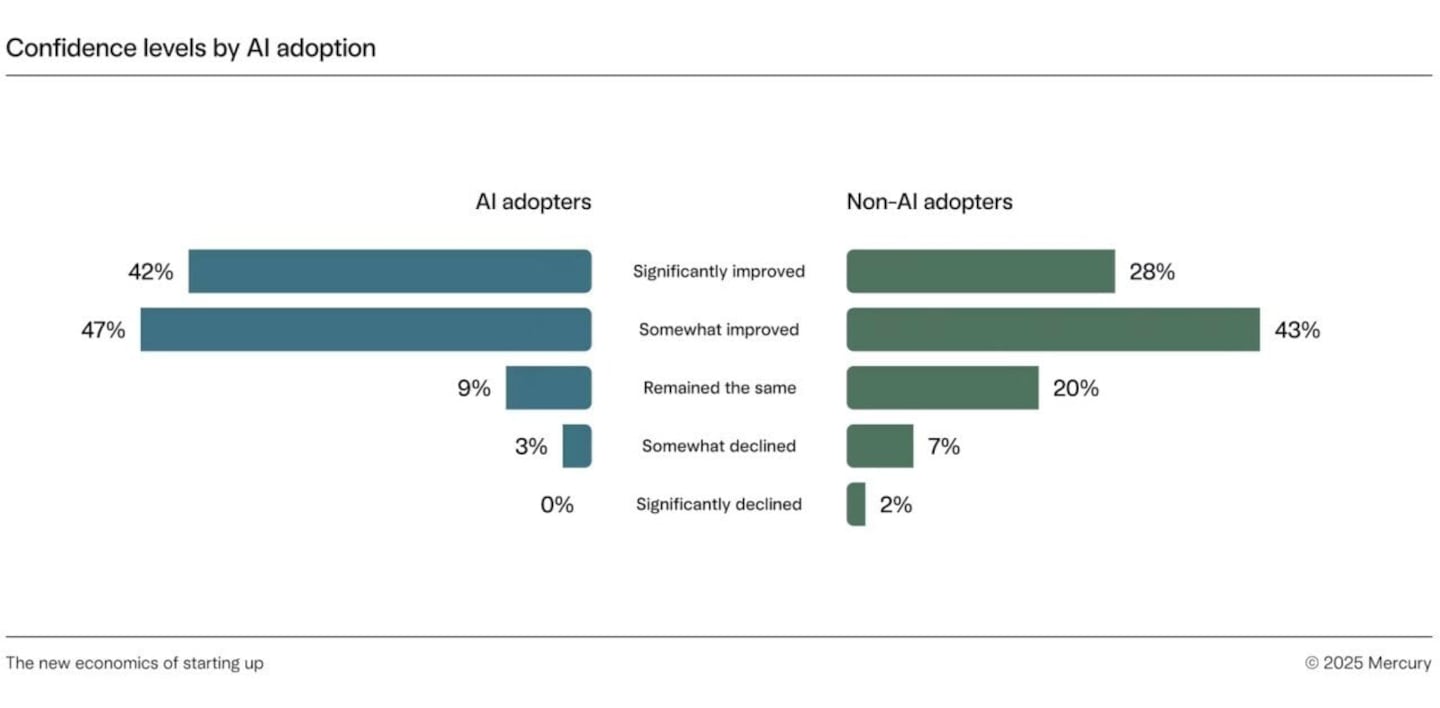Startups are strangely upbeat in 2025: AI may be the reason why
The economy feels shaky, but founders aren't flinching. In fact, most are more confident in their business's financial future than they were a year ago — and the boldest optimism comes from those leaning hardest into AI. Mercury's survey of 1,500 U.S. entrepreneurs running companies less than six years old found that 60% of businesses that had significantly adopted AI reported their confidence in financial prospects had "significantly improved" compared to 2024 — more than double the 28% of businesses that hadn't adopted AI tools. This connection between innovation and sentiment underscores a broader shift: resilience today is powered by both mindset and technology.
How are founders feeling in 2025?: On confidence, sentiment, and the big and small pictures
Let's talk about the elephant in the room: With economic tumult and anxiety seemingly through the roof, how are entrepreneurs actually feeling about their own business's financial prospects? In an economy that has many people tightening belts, those building early-stage companies are feeling ... surprisingly good.
Concerns about inflation were real (36% said it had negatively impacted their business), but were slightly outweighed by businesses positively impacted (38%); 25% of respondents indicated they weren’t meaningfully impacted. That said, these entrepreneurs weren’t without worry — they had at least some concern about the impact of the following on their business or industries:
Mercury
But few seemed overwhelmed by their macro worries. In fact, 87% of entrepreneurs reported their confidence in their business’s financial prospects had improved compared to 2024. Only 3% said it declined.
Founders at companies with higher annual revenue ($10M or more) were most likely to report significant improvement in year-over-year confidence (50%, compared to 38–39% for companies with lower annual revenue) — though, we suppose, that could be because they’re already bringing in good money.
Mercury
Mercury also spotted a meaningful split between companies that reported significant use of AI and those that didn’t. Those whose businesses have significantly adopted AI noted dramatically higher optimism, regardless of industry: 60% said their confidence in financial prospects had “significantly improved” compared to 2024, versus just 28% of companies that haven’t adopted AI tools. (The average across AI adopters overall — including those who had only some adoption of the tech — was still noteworthy at 42%.) Companies that have invested significantly in AI adoption had a 93% positive outlook overall, versus 71% for non-AI adopters. Which came first: the AI or the optimism?
Slicing by industry, founders in financial services were most likely (49%) to note significant year-over-year improvements in confidence in their financial prospects, while those in professional services were least likely (32%).
The experience chasm
All survey respondents were building early-stage companies (formed within the last six years), but those who had been involved in founding one or more companies before seemed more tempered across the board.
Regardless of revenue or AI use, first-time founders were more likely than repeat founders (88% vs. 76%) to report improved optimism. Perhaps this suggests that first-time founders — even if they’ve been at early-stage companies before — may lack certain battle scars that make repeat founders more measured in their outlook. And this may be true even if, as our data shows, they’re in similar industries, of similar ages, and/or earning similar revenue.
A look at some noteworthy gulfs:
Mercury
Looking Ahead
The picture that emerges is clear: despite economic headwinds, early-stage founders are pressing ahead with confidence, conviction, and an eye toward the future. Optimism is running high — especially among those embracing new technologies like AI — and even first-time entrepreneurs are meeting today’s challenges with resilience and creativity.
This story was produced by Mercury and reviewed and distributed by Stacker.









